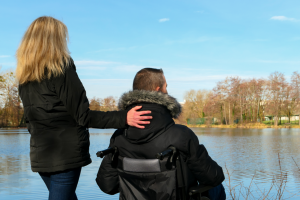WHO IS A CARER?
A carer is someone who provides unpaid care and support to a family member, friend, partner or neighbour whose health and well-being would suffer without their help. This could be due to illness, disability, frailty, a mental health issue or addiction or substance misuse problems.
A carer can be a person of any age, from a child to an adult.
A parent carer is a parent or guardian who provides care and support to their child due to disability, illness or complex care needs. Parent carers are likely to support their child for many months or years and can continue after some children have begun living independently.
A young carer is a person under 18 who helps look after someone in their family, such as a parent or sibling, who has an illness, disability or mental health issue.
Carers may care for more than one person, and some themselves have a disability or illness.
3 in 5 people will become a carer at some point in their life, sometimes more than once.
Anyone can become a carer, at any time, due to a sudden event such as an accident, or through a gradual process when a person’s physical or mental health slowly deteriorates.

WHAT MIGHT A CARER DO?

Carers can provide both practical and emotional support to the people they care for.
Carers may help with the issues of daily living, domestic tasks such as cooking and cleaning, look after the finances of the person they care for, and physical tasks such as lifting and assisting with mobility.
Carers are also responsible for ensuring those who they care for are safe and well looked after. This may mean that they have to undertake personal care tasks, supervising and administering medication and feeding tubes, and safety supervision. They may also have to arrange medical appointments and transportation for the person they care for.
The type and amount of support provided may vary considerably from carer to carer depending upon individual needs. Some carers can provide a few hours of care each week whereas for others it may be a full time role. Therefore, it is not possible to fully define the role of a carer.
Caring roles can vary over time and can be difficult to predict from day to day. Each situation is different, and the role of caring will not be the same for everyone.
HOW DOES CARING AFFECT SOMEONE'S LIFE?
Health
Caring can be physically demanding; people with care needs may need help getting in and out of bed, being lifted into a wheelchair or hoist, or help with movement, which can affect a carer's physical health. Many carers also report that their mental health has suffered as a direct implication of their caring role.
Social Life
Carers often miss out on socialising if their loved ones can't be left on their own, and many carers report feelings of social isolation and loneliness.
Education
Young carers can find it difficult to juggle caring with their education. Having a parent or sibling with a care needs can disrupt home life and can be very tiring for young people meaning they may struggle to concentrate in school.
Employment
Caring can be very time-consuming and carers often have to manage medical appointments and care arrangements which can lead to absences from work. Caring can also lead to a reduction in hours or giving up work completely.
Finances
The additional expenses that come with caring can put a financial strain on carers. People with care needs may need additional care, specialist equipment and transport, all of which can be very expensive. Carers often report having to use their own savings to fund caring, and facing financial problems as a direct result of caring.
CARING IN THE ISLE OF MAN
Statistics from the Isle of Man Census Report 2021 indicate that there are 4,869 carers living in the Isle of Man.
However, it is estimated that the true number of carers on island is over 10,000. It is also estimated that there are over 1,000 young carers living on island.
Our Island's carers save our local economy between £40 and £90 million every year. This shows how valuable carers are and how much support they provide.
Over one third of our Island's carers are providing over 35 hours of care per week and for some, this is in addition to full or part time employment or education and other commitments such as childcare.
The 2021 Census also revealed that 58% of carers living in the Isle of Man are female, and 48.5% of carers are between the ages of 45 and 64.
The number of carers is set to increase even more over the next 10 years meaning we will need to provide even more care hours to support them and their loved ones.

